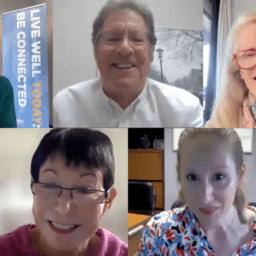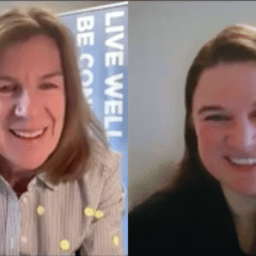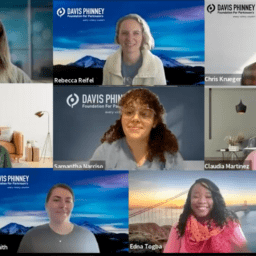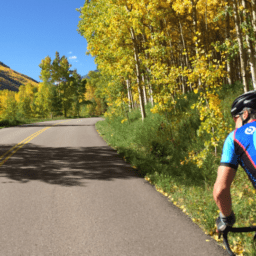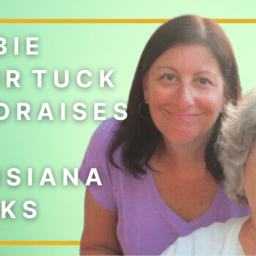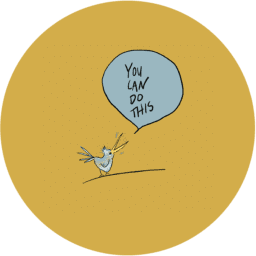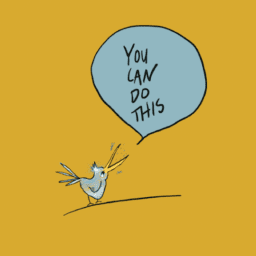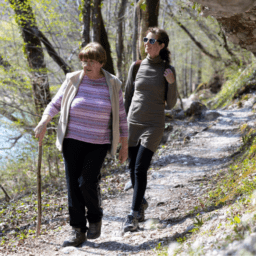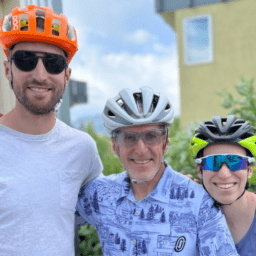Written by Connie Carpenter Phinney
Our March 2024 Care Partner Meetup featured Angela Robb and Gail Gitin. Gail is a regular panelist who lost her husband to Lewy body dementia three years ago. Angela married her husband knowing he was diagnosed with Parkinson’s at a very young age: They’ve lived with Parkinson’s for four decades. I’m Connie, the wife of Davis Phinney, and the co-founder of the Davis Phinney Foundation. We are all on the panel for you, our fellow care partners.
This session was dedicated to answering questions from our viewers/listeners, but we began with some techniques for relaxation and to reduce anxiety and stress. We practiced box breathing as a way of calming our systems; we’ve included links at the end of this blog to look at the work of Resmaa Menakem, and a simple exercise that opens your vagus nerve to work on your mind-body connection. Before we began taking questions, I talked about “time-tripping” and the practice of mentally putting yourself into a “favorite place” to help you manage more challenging moments.
QUESTIONS DISCUSSED DURING THE MEETUP
What are some TIPS FOR ENJOYING A MEAL OUT?
Gail suggested having the kitchen cut up food before delivering it to the table for your person with Parkinson’s. A listener suggested handing a small, printed card to the waiter to clarify why your person might need some additional help. We discussed the value of considering the placement of your table because louder environments or environments with more visual distraction can be more challenging.
HOW DO YOU HAVE A CONVERSATION WITH YOUR PERSON WITH PARKINSON’S ABOUT THE INITIAL DIAGNOSIS?
Consider the importance of you, the care partner, being at all doctor appointments to understand what your person is dealing with and how you can help. For example, you need to know what you should be looking out for, including items in your home that need attention and could create difficulties. The benefit of attending doctor visits starts with the earliest appointments.
Importantly, every practitioner we’ve welcomed on the meetup has said they encourage care partner attendance at appointments. Our recent guest, neuropsychologist Mark Mapstone, told us he hands out his phone number to care partners and patients. Some of you may have your movement disorder doctor on speed dial, but others don’t accept home phone calls. We make the most of our meetings and send notes to Davis’s physician’s assistant through their internal portal.
Angela offered two tips for doctor’s appointments: “I had a care partner friend who sometimes scheduled her own appointment with the movement disorder specialist or neurologist. Sometimes she didn’t even tell her loved one that she was going to go, but she felt like it was important for her to meet with the neurologists, one on one.”
Angela’s second tip was to record visits–if you get permission of the doctor: “When you go to the appointment there’s a lot of stuff to take in. You might be dialoguing with them, so you may want to record it on your phone or take a little hand recorder so you can review that after the appointment.” Reviewing these notes may be personally helpful for you or a way to frame a conversation about the current circumstances, regardless of how long it has been since diagnosis. The otter.ai app is one tool to help you record conversations (and it’s free for up to 300 minutes of recording). It even gives you an immediate transcription.
HOW CAN A CARE PARTNER IMPROVE THEIR CAPACITY FOR PATIENCE?
The question of improving patience focused on how to have patience when your person doesn’t seem to understand their limitations and changing abilities.
Regulating yourself is often a good place to start. For example, if you’re feeling overwhelmed or frustrated, try the aforementioned breathing practice to allow yourself time to calm down. Everyone in the care giving space knows that the situation only gets worse when we get angry. Afterward, we don’t feel good about ourselves and our person with Parkinson’s symptoms may ratchet upward. It does no one any good if you can’t respond–even to the most stressful moments–with kindness.
Sometimes it can feel like your person has regressed and is behaving in a more childlike manner, but we must find space to forgive their behaviors because it’s the disease—not the person—behaving in this way. Gail reminded us how her husband Gene would say, “I’m not doing this on purpose.” It’s important to remind ourselves of this even when the behavior seems willful. It’s the disease–not the person.
I personally struggle with is hyper-vigilance–especially around safety issues like when my person is standing with his back to a steep flight of stairs and I’m fearful he will get injured. This relates to the person not seeming to be aware of their limitations or the consequences of their poor balance. When we become overprotective, it comes at a price to our wellbeing and can even damage the relationship. But if the overarching outcome results in a safer environment, it’s worth it. And it’s important to try and have polite dialogue around interventions you make so they are better understood and acknowledged.
Give yourself credit for doing the best you can! During the meetup, Angela reminded us that if we take a few seconds to calm down, we can give ourselves permission to be kinder and not slip into negatively reacting on impulse.
WHAT’S THE BEST WAY TO TEACH FRIENDS AND FAMILY ABOUT PARKINSON’S?
The task to teach others about Parkinson’s is really on us, the care partners, to keep our close family and friends informed. Your person may put on a very good show for friends–and often in the doctor’s office–but you are constantly privy to the challenges, and you know how constant they are outside of the “show.” If you hide the hard moments, it will be more difficult to get help when you need it. Angela offered that she and her husband are open books who try to not hide anything. They have found this behavior helpful during their time living with Parkinson’s.
HOW CAN YOU TEACH YOUR CHILDREN ABOUT PARKINSON’S?
Clearly, this teaching children about Parkinson’s depends on the age of the children, but since most of our listeners are older, it’s more likely we’re talking about older adults with busy lives. I encourage you to keep older children informed and learn to ask for help.
With younger kids, it’s important to give them age-appropriate information and encourage them to help their parents. With my kids–who were six and 10 when their dad was diagnosed–they each found a way to help, but both still needed to see their parent as healthy and not at risk of imminently dying.
Now that they are 29 and 33, my kids know how to lend a hand and choose to see their dad as successfully navigating a difficult disease. When I ask, they answer and do their best. Gail had an adult son who lived nearby and was very helpful while another son lived further away and was less able to assist. She understood this and asked them to help based on their capacity.
TIPS FROM OUR LISTENERS
We always appreciate not only our listeners’ questions but their willingness to help each other in the chat during our time together. This is why care groups are so important. Building community is key to living well adjacent to Parkinson’s.
Here are some tips and thoughts from our listeners in the chat this month:
- “I’m hard-of-hearing, and my wife has trouble speaking. Fortunately, she was a deaf-education teacher, so we know sign language. When we go out and she has dyskinesia, we gather a LOT of attention.”
- “One of our PD friends has a baseball cap he wears all the time that says I’m not drunk, I have Parkinsons! The Parkinson’s Foundation has small cards indicating that the PWP is not drunk [as] part of their Aware in Care kits.”
- “I recommend watching American Symphony, the Netflix documentary about Jon Batiste and his wife, Suleika Jaouad, and their walking through her cancer challenge together. Even if you can’t get out to a concert, this is an extraordinary and accessible experience. Also note Ms. Jaouad has written a best-selling memoir about her experiences: Between Two Kingdoms.”
- “When we share with others about her PD, they respond with ‘disbelief,’ such as ‘my grand-pa had PD and it didn’t look like this,’ or ‘she looks okay to me.’ I want to answer that one with: Let it go. People say foolish things, and this is typical of a non-helpful comment—right up there with ‘are you sure the doctors are right?’ Those in your inner circle will need to be informed by you, but the rest, well, you can’t do much about this type of non-helpful blurting, other than to let it go with some mindfulness techniques.”
WE LOOK FORWARD TO SEEING YOU NEXT MONTH!
Thanks to all those who joined us live this month. Our next meetup will be Tuesday, April 2, 2024. Please visit this webpage to register to attend the meetups live, if you haven’t already done so.
Additional Resources
Race and Healing: A Body Practice
Why Do Navy SEALs Use Box Breathing?
The Every Victory Counts Manual
“Should I Donate My Parkinson’s Brain to Science?”
Gear and Gadgets for the One You Love with Parkinson’s





